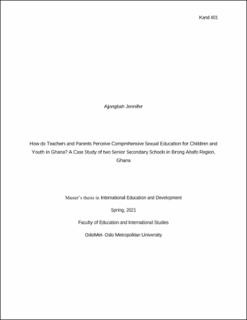| dc.description.abstract | Sex education in Africa is a very complex socio-cultural issue where it is a taboo for sexuality to be discussed between the adults and children. Ghana is not an exception in this situation. Meanwhile, the HIV and AID), teenage pregnancy continues to have the greatest impact in Sub-Saharan Africa, despite adult desires to construct children as ‘innocent. However, due to cultural tensions and a lack of clarity about what to teach. CSE uses a learner-centered approach to provide age-appropriate and phased education on human rights, gender equality, relationships, reproduction, sexual behavior risks, and disease prevention for children and young people. This study therefore seeks to understand how Ghanaian teachers and parents perceive the introduction of comprehensive sexual education for children and youth. The study adopted a qualitative research approach as to investigation into things in their natural settings. Fifteen teachers and parents’ participants were interviewed. Findings revealed that CSE had a positive on the impact on students to obtained knowledge on prevention of teenage pregnancy, promote girl’s empowerment and the fulfillment of their human rights, rape, and sexual harassment, help them to understand reproductive health issues better. Moreover, findings revealed that teenage pregnancy can be prevented through proper upbringing, educating students on sex, parental control and societal control. Lastly findings on the content of CSE in Ghana education systems were in line with the UNESCO guide as participants preferred their children to be educated on relationship and values, rights and culture, violence and staying safe, skills for health and well-being, sexual and reproductive health. Participants were against the education of children in relationship to lesbianism, gay and bisexual transgender. The study concludes that teachers and parents had a positive perception on the implementation of comprehensive sexual education in Ghana’s education system. | en_US |
